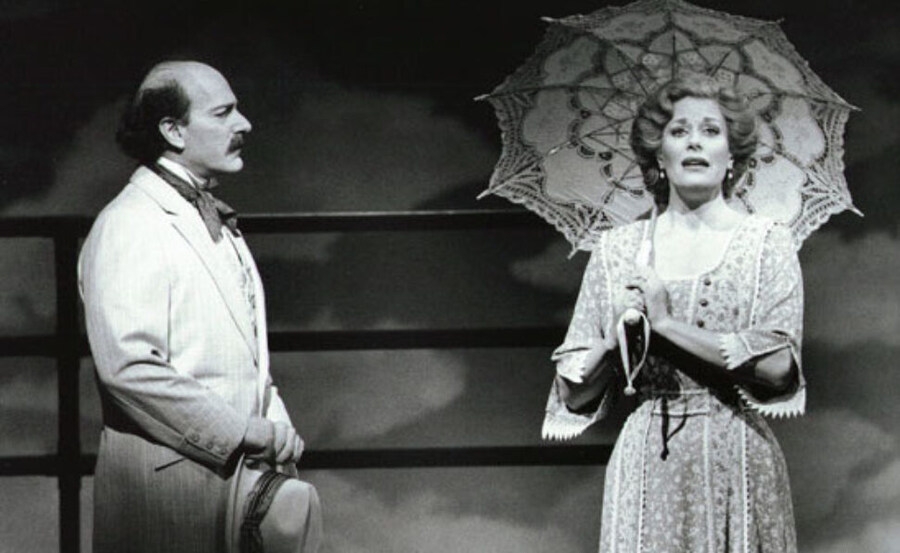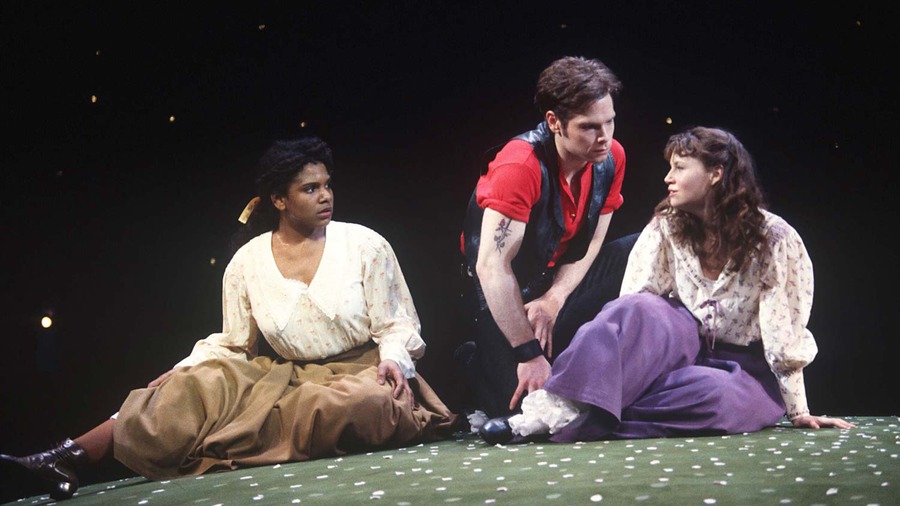The following essay won’t be found in Laurie Winer’s new book, Oscar Hammerstein II and the Invention of the Musical, to be published this week by Yale University Press, though it touches on many of the same themes and reference points; a review of the book can be found here.
As in many subcultures, musical theatre lovers have secret handshakes that allow us to recognize each other. Say you are speaking to a group and out slips the phrase, “And things being as they are…” If, before you can utter another syllable, someone emphatically interjects, “The back of the police station is out!”, you know you are with your people.
We are a relatively tiny group that glories in our smallness, who can recite in our sleep every nuance of every lyric from every great cast album. Arcane trivia spills from us like charm from Robert Preston. Kevin Daly, a theatre connoisseur on Twitter, has become something of an artist in this form of classic musical speak. He punctuates some of his funniest comments with, “This is for about six of you” or, “I was very popular in high school, can you tell?” He presides over a universe that worships lady deities of a certain age: Bea Arthur, Dorothy Loudon, Barbara Harris, Barbra Streisand, Imelda Stanton, Chita Rivera, and of course Angela Lansbury, the one and only Mame (Daly is still incensed that the costumes weren’t acknowledged by the1966 Tony nominating committee). One day he might observe, “Sigmund Romberg didn’t have to go that hard when he composed the ‘French Military Marching Song’ for The Desert Song. Follow me for this and other hot takes from 1926,” and another day drop this gem:
I know, Kevin, I know.
As subcultures go, ours is historically one of the funnest. We are entertaining, witty, bitchy, but also generous, life-loving, and, yes, progressive. Our classic musicals are on the right side of history, grounded in forward-thinking values and a belief in justice for all and devastating ridicule for bigots. At the same time (cognitive dissonance!) our foundational works are obviously products of their own time, and thus full of racism and sexism that must be addressed in some way when they are restaged. In her 2021 thesis paper for Wellesley College—“I’m an Indian Too”: A Contemporary Indigenous Reclamation of Racist Musical Tropes— Native American Kimimilasha James rightly points outs that 20th-century musicals allowed “white people to define everybody else’s racial category,” and that songs from such musicals as Peter Pan and Annie Get Your Gun “contained a variety of tropes that would come to denote Native Americans,” tropes that were actively hurtful to Indigenous people. She also notes, again rightly, that when Cher poses, as she has over the years, in Indigenous garb as a “Pocahottie,” she contributes to “the hypersexualization of a group of women who have the highest sexual assault rates in the country.”
What these separate truths mean for the future of the canon (and for comedy) is yet to be seen. I would only want to add that, for a female-identifying child, Tiger Lily is the coolest character in Peter Pan—way cooler than Wendy—and that Annie Oakley is a magnificently independent heroine in a long line of strong women put forth by the American musical from its very inception (check out Show Boat). You win some, you lose some.
In this sense, theatre directors have a superpower that film directors do not: They can comment on an old text in the current moment. In his 1994 staging of Carousel at Lincoln Center, for instance, Nicholas Hytner had Billy Bigelow sadly shake his head “no” when he hears his wife Julie Jordan tell their daughter that it is possible “fer someone to hit you—hit you hard—and not hurt at all.” Indeed, because Billy, the person who dealt those blows, is shaking his head from beyond the grave—ironically, the place where he has finally learned to be human—the entire production says no to Julie’s logic as well.

And Julie—who would fit right in alongside Tosca, Mimi, Norma, Carmen, Manon, Violetta, Lucia di Lammermour, and Cio-Cio-San—is an anomaly in musical theatre, whose women are much more likely to insist that you do not rain on their parade, particularly while they are defying gravity. In the musical Ragtime, lyricist Lynn Ahrens wrote one of the most stirring tributes to the awakening of a feminist in “Back to Before.” Even more moving than that is the moment when that same character, known as Mother, is forced to step up and become a whole human being. Her husband is on his way to the North Pole with Admiral Perry, and she alone must decide what to do when a Black baby is found partially buried in her yard, and its mother is about to be taken to the charity ward and then to prison. As she decides to take in both the mother and child, she asks herself what action her husband would have taken if he had been present:
You would have
Gently closed the door
And gently turned the key
And gently told me not to look
For fear of what I might see
What kind of woman
Would that have made me?
The awakening conscience is something the musical celebrates—a not insignificant or obvious value in contemporary America. Remember Jean Valjean and his decision to step forward as the bread thief rather than let another man go to jail for his crime? As he wrestles with the problem in “Who Am I?,” a high flute (or synth) accompanies his progress, growing urgent as he reaches his epiphany—he has no choice but to reveal himself. “If I speak I am condemned,” he reasons. “If I stay silent I am damned.” That flute (or synth) is the musical equivalent of a thought that gnaws at you until it consumes you, and you are changed. Do the right thing. Care about others, even strangers, even poor strangers with no power or recourse whatsoever.
As I said, ours is a joyous subculture. I think this springs from the communal essence of it: We are all together in the same room, the audience, the artists, the spirit. You can’t help but feel bonded with those who breathe the same air when you are experiencing the sublime—or even the ridiculous. As the saying goes, a shared joy is doubled and a shared grief is halved. And a belief in the communal good fuels the progressive ethos of the musical play as well as most of the ecstatic experiences we have in a theatre.
It’s hardly an accident that one of the most recorded and loved ballads in the repertory is called “You’ll Never Walk Alone,” with lyrics by Oscar Hammerstein II. The idea of a collective good is strewn throughout Hammerstein’s work, including what is probably the most famous anti-racist song ever to emerge from a musical, “You’ve Got to Be Taught.”
Even though we musical lovers are, as compared with movie fans, say, a small part of the country’s cultural life, a tiny subculture, we know that what happens on Broadway tends to matter, though it may take years to seep into the wider world (take a look at the career of Stephen Sondheim). That’s why more than 40 producers, including Jennifer Hudson, Don Cheadle, Mindy Kaling, and RuPaul Charles, gathered resources to bring Michael R. Jackson’s A Strange Loop to the Lyceum Theatre last year. This brash, funny, and heart-rending musical about the difficulties of a gay, Black musical theatre writer whose family thinks he is going to hell, ran for a little more than 300 performances, a decent run, which followed close on its Pulitzer Prize for drama and last year’s Tony for Best New Musical. When it closed in January, Jackson said he saw the show as burning “like a supernova across the firmament for as long as it can. And then the loop itself closes. And then, after this, maybe some other people will start the loop again.”
Probably like many people no longer young, I do not want to see the shows that formed me and my parents before me being assigned to the dust heap. I also believe, with an optimism partly nurtured by the musicals of the past, that the form will continue in all its hoary glory, because, despite the difficulties, most theatre artists consider it a privilege and a calling to deliver the kind of ecstatic experiences the form is capable of. These musicals, the ones so charmingly championed by the likes of Kevin Daly, are works that, when produced brilliantly, are able to sustain us, renew us, send us back out to the world restored and able to brave life again…until the next time we can return to the theatre and lapse into a collective puddle of joy and tears.
As Daly once put it: “As it was at the overture and shall be at the exit music, bliss without end. Amen.”
Laurie Winer (she/her) is a former drama critic and a founding editor at the Los Angeles Review of Books.


